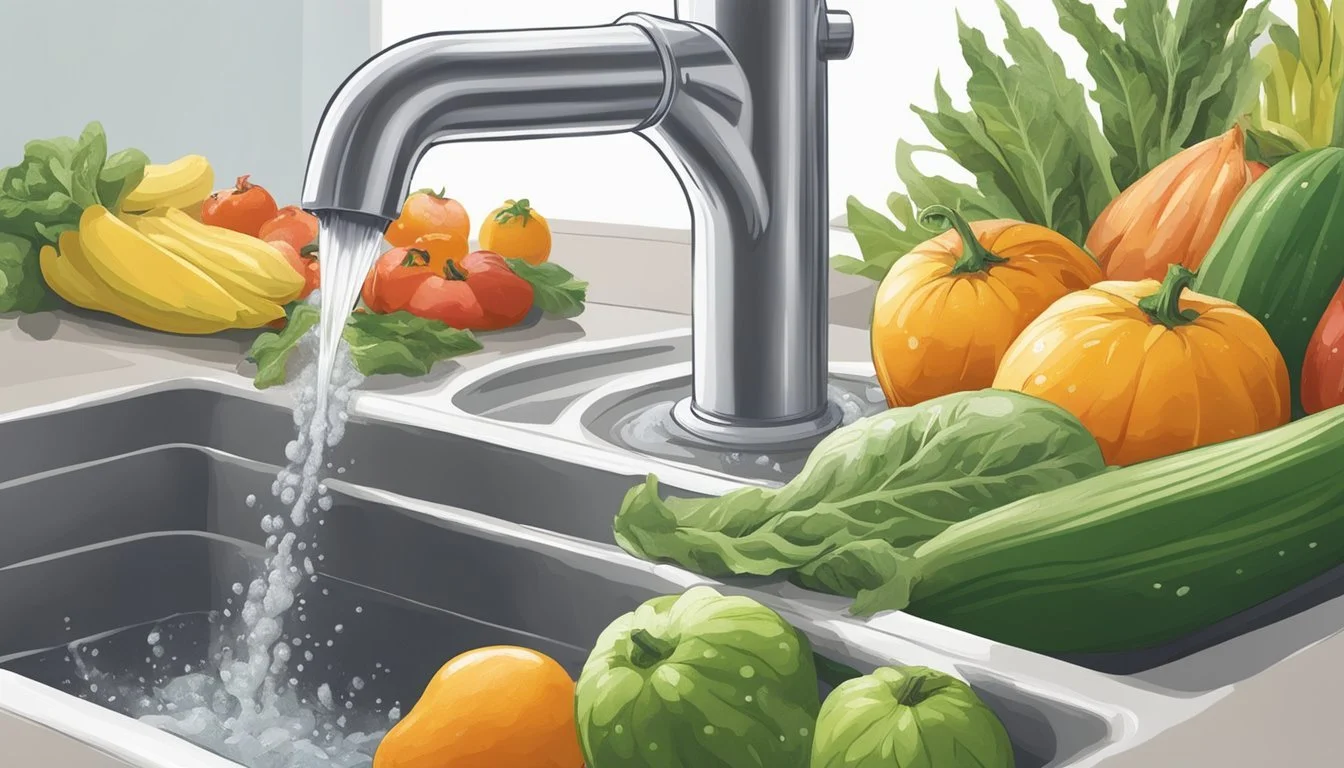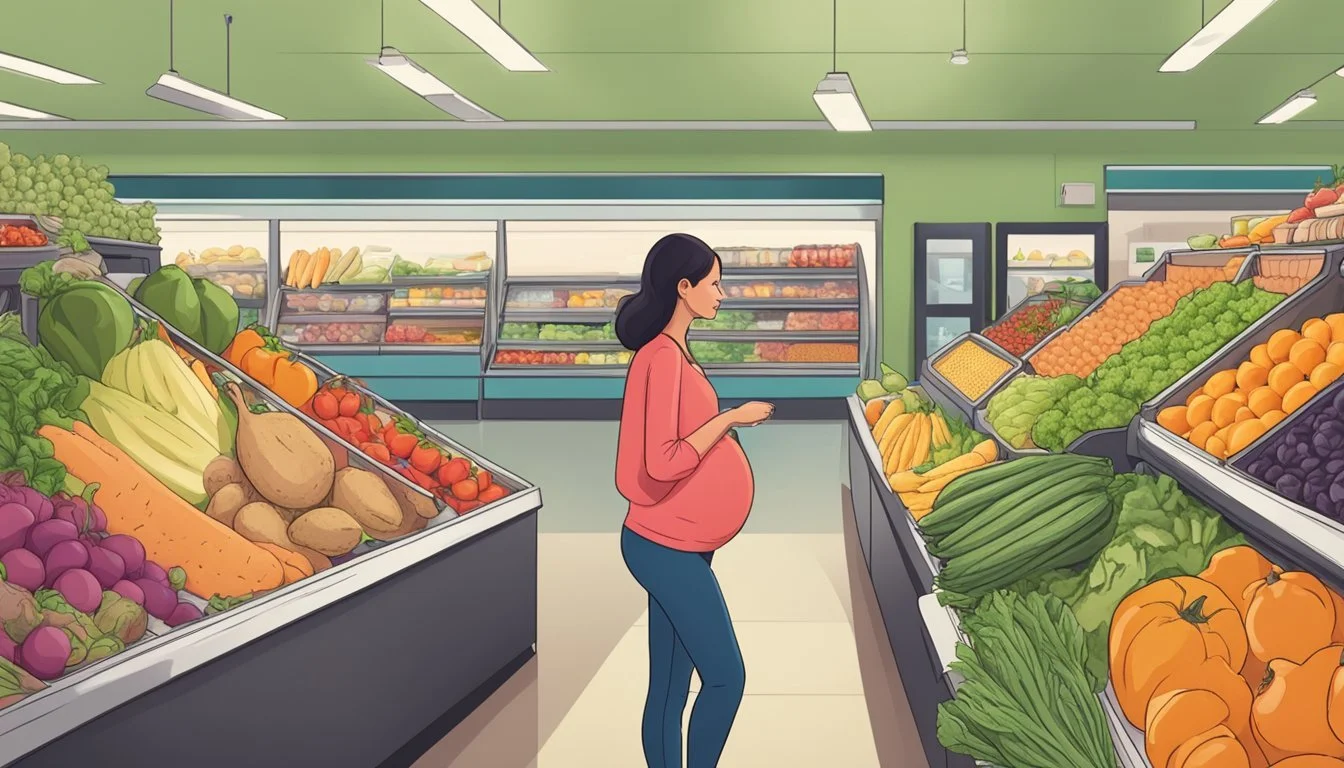Should I Avoid Unwashed Produce While Pregnant?
Health Risks & Precautions
When expecting, women often receive ample advice on what to eat and what to avoid, creating a crucial need for clear, evidence-based guidance on diet. Among the myriad dietary precautions, the safety of produce consumption during pregnancy comes to the forefront. The consumption of unwashed fruits and vegetables presents a health risk due to the potential presence of harmful bacteria and parasites such as Listeria, Toxoplasma, and E. coli. These pathogens can cause foodborne illness, which can be particularly severe during pregnancy, potentially leading to serious health implications for both the mother and the unborn child.
Proper washing and handling of fruits and vegetables can significantly reduce the risk of exposure to these pathogens. It is important for pregnant individuals to be meticulous about washing their produce to remove any traces of soil or bacteria. In addition to washing, certain high-risk foods, such as pre-cut melons or raw sprouts, might be best avoided altogether unless they can be thoroughly cleaned and properly handled.
Health agencies like the Centers for Disease Control and Prevention emphasize the importance of safe food practices for pregnant people. Safety measures include selecting the right produce, washing it diligently, and storing it appropriately to minimize any risk of foodborne illness. Such practices ensure that the nutritional benefits of fruits and vegetables can be enjoyed without compromising the health of the mother or the fetus.
The Importance of Food Safety During Pregnancy
During pregnancy, ensuring food safety is crucial as it impacts both the mother's and the unborn child's health. Making informed food choices and understanding the risks of foodborne illnesses can protect against complications such as miscarriages or premature deliveries.
Understanding Foodborne Risks
Pregnant individuals are particularly susceptible to foodborne illnesses because of the changes in their immune system that can make them more vulnerable to infection. Harmful bacteria, viruses, or parasites in foods can lead to conditions that pose a threat not only to the pregnant person but also to the fetus, which can have serious health consequences.
Key pathogens to avoid during pregnancy include:
Listeria: Can lead to miscarriage, stillbirth, or premature delivery.
Toxoplasma gondii: Can cause birth defects or developmental delays.
To minimize these risks, experts advise:
Heating hot dogs, deli meats, and cold cuts until they are steaming hot to prevent listeriosis.
Ensuring dairy products are pasteurized.
Wash: Thoroughly rinse fresh fruits and vegetables.
Separate: Use different cutting boards for meat and produce.
Cook: Verify meats are cooked to a safe internal temperature.
Chill: Refrigerate perishable foods promptly.
Essential Nutrients and Food Groups
A balanced diet that includes essential nutrients and proper food groups is indispensable during pregnancy for fetal development and maternal health. Pregnant women require adequate vitamins, protein, omega-3 fatty acids, whole grains, and beans to support the growth and well-being of the fetus as well as to maintain their own health.
Essential Nutrients:
Protein: Supports fetal growth and increases in the blood volume - Include lean meats, poultry, fish, beans.
Omega-3 fatty acids: Important for the development of the fetal brain - Sources include fish oil, flax seeds, and walnuts.
Vitamins: Such as folic acid, are vital for preventing birth defects - Found in leafy greens, citrus fruits, and fortified cereals.
Important Food Groups and Sources:
Whole grains: Provide energy and fiber - Examples include oatmeal, whole-grain bread, and brown rice.
Beans: Offer protein and iron, which are essential for the baby's development and the mother's health.
Consulting with a healthcare provider can offer personalized guidance to ensure dietary needs are met while maintaining food safety practices.
Risks of Unwashed Produce
Pregnant individuals should be keenly aware of the potential dangers posed by consuming unwashed fruits and vegetables. These foods can harbor harmful bacteria and parasites if not properly cleaned before consumption.
Bacteria and Parasites on Produce
Unwashed produce may carry bacteria such as Salmonella, E. coli, and Listeria, which can cause serious health issues, especially in pregnant individuals who have a more vulnerable immune system. Another concern is the presence of parasites like Toxoplasma, the cause of toxoplasmosis, which if contracted for the first time during pregnancy can lead to significant harm to the unborn baby. It is crucial to acknowledge that these microorganisms can persist on the surfaces of fruits and vegetables, and thus thorough cleaning is necessary to avoid potential infection.
Common bacteria found on unwashed produce:
Salmonella
E. coli
Listeria
Parasites potentially present on produce:
Toxoplasma (causing toxoplasmosis)
Preventing Contamination and Infection
To reduce the risk of contamination and infection from unwashed produce, pregnant women should follow specific hygiene practices. Using a vegetable scrubber can significantly decrease the presence of pathogens on the skins of fresh produce. Moreover, it is advisable to consume cooked rather than raw produce, as heat can effectively kill these harmful microorganisms.
Steps for prevention:
Rinse produce thoroughly under running water.
Scrub the surfaces of fruits and vegetables with a clean brush.
Cook produce when possible to ensure any remaining bacteria or parasites are killed.
Implementing these simple steps can help protect against the risk of listeria infection and other foodborne illnesses that might arise from consuming unwashed fruits and vegetables.
Avoiding High-Risk Foods
During pregnancy, certain foods pose higher risks than others due to potential contaminants such as harmful bacteria and high levels of mercury. It's essential for expectant mothers to be informed about these risks to ensure the health and safety of themselves and their developing babies.
Seafood and Mercury Exposure
Seafood can be an excellent source of omega-3 fatty acids, proteins, and other nutrients beneficial during pregnancy. However, it can also contain mercury, a toxic element that can interfere with the neurological development of a fetus. Pregnant individuals should avoid high-mercury fish like shark, swordfish, king mackerel, marlin, orange roughy, and bigeye tuna. Choosing lower-mercury fish such as skipjack tuna, shrimp, salmon, pollock, and cod is advised, aiming for up to 12 ounces a week.
Dairy and Pasteurization
Dairy products provide essential nutrients like calcium and vitamin D, but the key is to ensure they are pasteurized to avoid exposure to bacteria. Pregnant individuals should avoid unpasteurized milk and products made from it. Soft cheeses like brie, feta, camembert, queso blanco, and queso fresco can harbor listeria unless they are clearly labeled as made from pasteurized milk.
Meat, Poultry and Eggs
Protein sources such as meat, poultry, and eggs are vital for the growth and development of the fetus but they must be properly cooked. Pregnant individuals should avoid raw or undercooked meat, raw eggs, as well as unpasteurized meat spreads, and deli meats unless reheated to steaming hot temperatures. All poultry should be cooked to an internal temperature of 165°F and other meats to at least 160°F. Utilizing a meat thermometer ensures both safety and optimal cooking.
Foods to Specifically Avoid While Pregnant
When pregnant, certain items must be avoided to ensure the health and safety of both the mother and baby. These items range from certain beverages to raw produce that may contain harmful bacteria or chemicals.
Alcohol and Pregnancy
Alcohol is one of the most significant substances to avoid during pregnancy as it can lead to fetal alcohol syndrome, which may cause brain damage, vision issues, intellectual disabilities, and low birth weight. There is no known safe amount of alcohol during pregnancy, and all forms—beer, wine, and spirits—should be avoided entirely to prevent potential harm to the developing fetus.
Caffeinated Beverages and Pregnancy
Expectant mothers are advised to limit their caffeine intake. High caffeine consumption can be associated with risks such as low birth weight and preterm birth. Coffee and tea, the most common sources of caffeine, should be consumed in moderation; it is recommended to limit caffeine to less than 200 milligrams a day — roughly equivalent to one 8-ounce cup of brewed coffee.
Unwashed Vegetables and Sprouts
Eating unwashed fruits and vegetables can introduce harmful bacteria like E. coli or cause infections that may affect the placenta. Special caution is needed with sprouts, including alfalfa, radish, and clover, due to their high risk of contamination. These should be thoroughly cleaned or cooked to eliminate potential bacteria.
Additional High-Risk Items
Raw or undercooked eggs: Should be avoided to reduce the risk of Salmonella.
Unpasteurized dairy products and juices: These can contain Listeria or other bacteria leading to food poisoning and complications in pregnancy.
Soft cheeses: Like Brie and Camembert, often contain Listeria if unpasteurized.
Deli meats and pre-made meat salads: Should be avoided unless thoroughly heated to prevent Listeria infection.
Raw meat and poultry: Need to be cooked to safe internal temperatures (poultry to 165°F, whole cuts of beef to 145°F) to avoid foodborne illnesses.
Pregnant individuals should consult a healthcare provider for comprehensive guidelines on dietary restrictions and safe food handling.
Safe Food Handling and Preparation
Proper food safety practices are essential in preventing foodborne illness, especially for pregnant individuals. They should prioritize washing produce, thoroughly cooking meats, avoiding unpasteurized products, and preventing cross-contamination.
Cleaning and Cooking Produce
Pregnant individuals must wash vegetables and fruits thoroughly under running water to remove any dirt and bacteria, even if they plan to peel the produce later. For produce with hard surfaces, scrubbing with a clean produce brush is advised. Raw sprouts should be avoided as they often contain harmful bacteria such as Salmonella, Listeria, and E. coli. It's safer to eat sprouts that have been cooked thoroughly.
Safe Consumption of Meats and Seafood
Raw or undercooked meats and seafood pose a significant health risk due to bacteria such as Campylobacter, Listeria, and Salmonella. Pregnant individuals should cook chicken to an internal temperature of 165°F and fish and shellfish like shrimp, oysters, and clams until they are opaque and flake easily with a fork. Avoid raw fish and sushi made with raw fish to minimize the risk of foodborne illness.
Avoiding Cross-Contamination
Cross-contamination can transfer harmful bacteria from one food to another, especially when raw meat, poultry, or seafood comes into contact with ready-to-eat foods. Pregnant individuals should utilize separate cutting boards for raw meat and another set for veggies and fruits. Utensils, plates, and cutting surfaces must be thoroughly cleaned after handling raw products.
Conclusion
During pregnancy, it is imperative that individuals prioritize food safety to protect both their health and that of their unborn child. Unwashed produce poses a risk for contamination with harmful pathogens such as Salmonella, E. coli, and Listeria, which can lead to serious foodborne illnesses. These illnesses are particularly concerning during pregnancy due to a weakened immune system, increasing both the mother's and the fetus's vulnerability.
The Centers for Disease Control and Prevention (CDC) strongly recommends thoroughly washing fruits and vegetables under running water before consumption. A vegetable brush can be used to scrub the surfaces of hard-skinned produce. This practice is crucial whether the produce is to be eaten raw or cooked.
For Pregnant Individuals:
Always wash produce before eating or cooking
Use a produce brush for hard-skinned fruits and vegetables
Avoid unpasteurized juices and dairy products
Ensure meats are cooked to safe internal temperatures
Discussing dietary practices with a healthcare provider is always advisable for pregnant individuals. They can provide personalized guidance based on the patient's unique health profile and any specific risks.
In summary, maintaining strict hygiene practices with produce and following CDC guidelines helps minimize the risks of foodborne illnesses during pregnancy. This approach is essential to safeguard maternal and fetal well-being.







